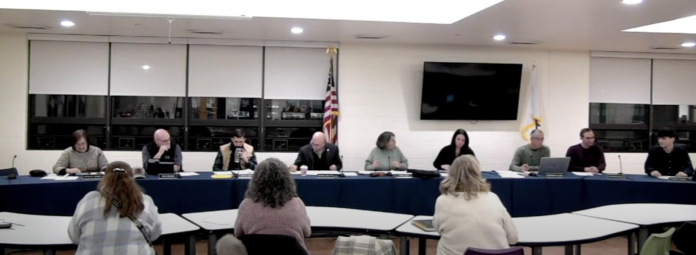BURRILLVILLE – Students and teachers in the Burrillville School District will now have guidance on the appropriate use of artificial intelligence, with a policy governing when it’s ok to utilize the emerging technology as a tool for education.
Members of the Burrillville School Committee passed a new AI policy at their meeting on Tuesday, Feb. 11, with language that delineates permitted and prohibited uses.

“The policy puts some parameters around student use by grade level and appropriate uses,” said Supt. Michael Sollitto. “Obviously, it’s something that’s going to continue to evolve.”
“This policy establishes guidelines for responsible use of generative artificial intelligence by students and staff in Burrillville Public Schools to maintain academic integrity and prevent plagiarism and cheating,” notes the plan. “AI is a powerful tool in education but should be used judiciously and in conjunction with human instructors who can provide context, guidance, and support essential for holistic learning.”
Committee member Sean Bouzan noted that AI is a tool that can often be misunderstood.
“It’s a good tool for kids to cheat – but used in the right hands in the proper way even for staff – it’s almost in every industry now,” Bouzan said.
Sollitto said the district’s last professional development day actually focused on artificial intelligence, with a roundtable with industry experts and some 25 to 30 teachers in attendance.
“We’ll continue to offer those kinds of opportunities for teachers,” Sollitto said.
The district’s new policy aims to provide general guidance and does not reference specific platforms. The superintendent noted that he expects it to evolve.
“Right now, I’d say the majority of use is by ChatGPT,” he said of students.
Bouzan pointed out that there are privacy concerns related to many of the platforms, with the exception of Google Workplace Plus.
“They keep it all in house,” he said. “It doesn’t leave. No one looks at it.”
Sollitto said the new policy comes with protocol that will be sent out to teachers.
Committee Chairperson Terri Lacey asked for an example of a positive use of the technology.
“How do these kids use this?” Lacey asked.

Sollitto noted that the negative connotation is that kids can use it to cheat, deferring the question to the committee’s student representative, Benjamin Pena.
“I used it today in engineering,” Pena said, noting it helped with his presentation for the SkillsUSA to RI competition. “I don’t take any coding classes so I’m not too familiar with how to code. I’ll type in what I want it to do and it can output code for me, and debug code for me which I don’t know how to do.”
“That’s something that takes awhile to figure out and it’s not really part of Ben’s curriculum,” said Sollitto. “Those kind of things would be beneficial.”
Sollitto noted that the technology can also be very useful from a teacher’s perspective.
“There are definitely some beneficial uses for it with staff,” he said.
“I think the first step is to have a policy, because it’s not going anywhere,” Sollitto added. “It’s going to get more in depth. It’s going to get more and more complex. Kids that are starting high school next year, they were born in the artificial intelligence age, really. All they know is Siri and Alexa and these kinds of apps where you just ask a question and they give you an immediate answers.”
Committee members unanimously approved the new policy, which can be found here.







